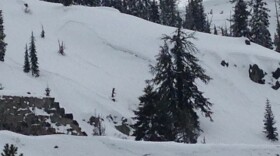Local researchers went out yesterday to measure the snowpack levels on Mount Rose. Reno Public Radio’s Noah Glick tagged along and learned that February fell short.
Jeff Anderson is walking down a ski run in the Mount Rose Ski Resort. He’s a hydrologist for the Natural Resources Conservation Service and he’s leading a group of scientists and members of the media to the Mount Rose snow telemetry, or SNOTEL, site where he’s taking manual measurements of the snowpack to make sure the data are consistent with electronic readings.
To do that, he’s using what looks like a series of long aluminum pipes.
“These are called the federal sampler, or the Mount Rose sampler. Basically you stick them into the snow, you get a core of the snow, you weigh the tubes with the snow in it, and then dump the snow out, weigh the tubes, then take the difference of those two weights, and that gives you the weight of the water that’s in the snowpack.”
The water content in the snowpack measures in at 31.1 inches, one-tenth of an inch off from the digital reading. But after such a strong start to the season, Anderson is hoping for more.
“This month of February was only 30 percent of average precipitation, so it was our driest month so far this water year.”
Anderson will take his final measurements in early April. In order to reach average levels for the season, he says the area needs 3-4 winter storms in March. But even that won’t make up for the amount lost during the last four years of drought.
“At this location, we’ve lost 74 inches of precipitation," Anderson says. "This year, we’ve made up one inch of the 74 inches that we’ve missed over the last four years. So we have a long way to go.”
Anderson says there’s about a 30 percent chance of getting enough precipitation in March to bring the Truckee, Carson and Walker basins back up to average levels.









